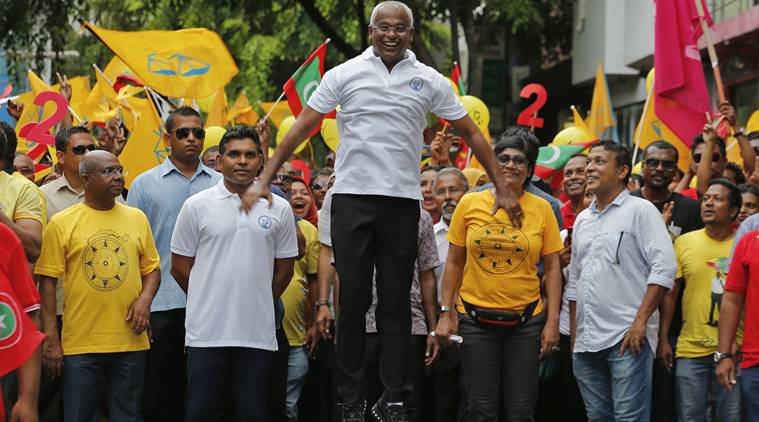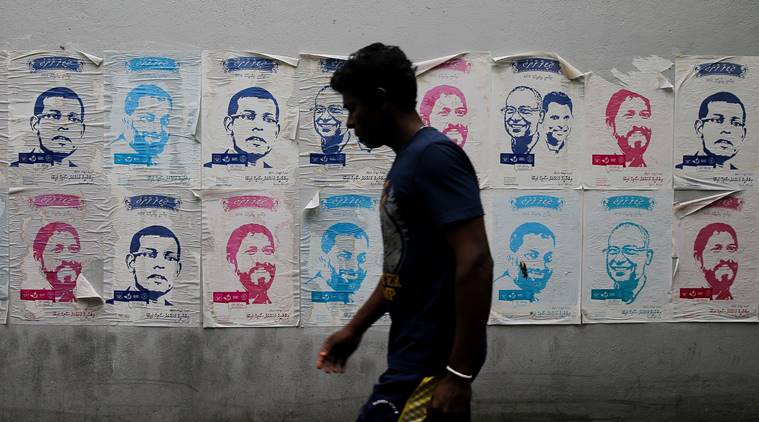 Maldives’ opposition presidential candidate Ibrahim Mohamed Solih, center, jumps as he walks in a street march with supporters in Male, Maldives. (Source: AP Photo/Eranga Jayawardena)
Maldives’ opposition presidential candidate Ibrahim Mohamed Solih, center, jumps as he walks in a street march with supporters in Male, Maldives. (Source: AP Photo/Eranga Jayawardena)
Maldives Opposition leader Ibrahim Mohamed Solih’s victory over incumbent president Abdulla Yameen in the country’s presidential polls on Monday was welcomed by India, which has been worried over the growing influence of China over the archipelago nation.
Under the Yameen administration, China invested millions of dollars in several big-ticket infrastructure projects in the nation in a bid to reverse the nation’s original ‘India first policy’.
China’s investments in Maldives
China helped build an extension to the international airport in the Maldives, and a bridge linking it to the nation’s capital, Male. The Chinese investment in Maldives was seen as part of its “String of Pearls” strategy to emerge as a major player in South Asia by developing a network of friendly ports in the region from Sri Lanka to Pakistan.
The Chinese investments also sparked fears in the Maldives, with opposition parties and critics accusing the Yameen government of walking into a debt trap.
India’s relationship with Maldives has been under strain
 A Maldivian man walks past a wall filled with posters showing opposition leaders, outside the residence of former president Mohamed Nasheed in Male, Maldives. (Source: AP Photo/Eranga Jayawardena)
A Maldivian man walks past a wall filled with posters showing opposition leaders, outside the residence of former president Mohamed Nasheed in Male, Maldives. (Source: AP Photo/Eranga Jayawardena)
India’s relationship with the Maldives had come under considerable strain after Yameen imposed a state of Emergency in February to annul a Supreme Court ruling that quashed the convictions of nine opposition leaders, including Mohammed Nasheed, the country’s first democratically elected leader and former president.
India had criticised the Yameen government for the imposition of the Emergency and urged it to restore the credibility of the electoral and political process by releasing the political prisoners.
Even after elections were announced in July, India expressed concern over the functioning of democratic institutions, including Parliament and the judiciary, which it said were not being allowed to function in a free and transparent manner.
How India reacted to the Maldives election result
Prime Minister Narendra Modi called Solih and congratulated him on his victory in the Presidential elections. Solih thanked the Prime Minister for his greetings and good wishes. The two leaders agreed to work closely together to further strengthen the close, friendly and good neighbourly relations between the two countries.
Earlier today, congratulating opposition candidate Ibrahim Mohamed Solih on his victory in the presidential polls, India said the election marks the triumph of democratic forces in the Maldives. India also hoped that the Maldivian Election Commission will officially confirm the result at the earliest.
“We welcome the successful completion of the third presidential election process in the Maldives which, according to preliminary information, Ibrahim Mohamed Solih has won,” the Ministry of External Affairs (MEA) said.
“We heartily congratulate Ibrahim Mohamed Solih on his victory and hope that the Election Commission will officially confirm the result at the earliest,” it said.
“This election marks not only the triumph of democratic forces in the Maldives, but also reflects the firm commitment to the values of democracy and the rule of law,” the MEA said.
Who is Ibrahim Mohamed Solih?
 Supporters of Maldives’ opposition presidential candidate Ibrahim Mohamed Solih celebrate their victory in Male, Maldives, Monday, Sept. 24, 2018. (AP Photo/Eranga Jayawardena)
Supporters of Maldives’ opposition presidential candidate Ibrahim Mohamed Solih celebrate their victory in Male, Maldives, Monday, Sept. 24, 2018. (AP Photo/Eranga Jayawardena)
Solih, 56, is the cofounder of the Maldivian Democratic Party. He had served as Parliament majority leader during former president Nasheed’s regime. He was elected to Parliament at the age of 32 as an independent candidate in 1995, and was part of the process to draw up the country’s Constitution after the then president Maumoon Abdul Gayoom introducted democratic reforms.
In his youth, Solih was part of the nation’s democracy movement, working to establish a multiparty parliamentary system. He also worked as a journalist for a state broadcaster and an opposition magazine before becoming a Parliament member.
His wife, Fazna Ahmed, is the cousin of Nasheed, who in 2008 became the first president elected in multi-party polls. He also cofounded the MDP along with Nasheed, who now lives in exile in Sri Lanka.
Unlike other leaders of his generation, Solih, known by his nickname – Ibu – never had to endure prison or exile. Supporters cited his 25-year career as a parliamentarian as evidence of his commitment and self-restraint in contrast to some of the country’s more power-hungry political leaders.
with inputs from Agencies